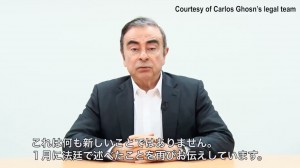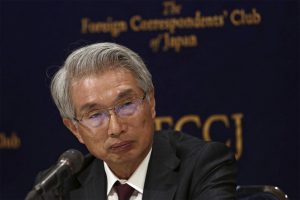
Former Nissan Chairman Carlos Ghosn issued a video in April in which he accused Nissan officials of staging a coup against him.
Carlos Ghosn, the ousted former head of Nissan and the Renault-Nissan-Mitsubishi Alliance, scheduled, and then quickly cancelled, a news conference in Tokyo on Friday during which it was widely expected that the 65-year-old executive was going to lay out evidence behind his claims of innocence in the financial corruption case he is embroiled in.
Ghosn has not spoken publicly in months, last time only briefly as he faced a court deciding whether to grant him bail, a move that prosecutors had opposed. The Brazilian-born executive later did win release but when he scheduled an earlier news conference Ghosn was instead re-arrested on additional corruption charges.
It appeared that his latest plan to speak to the media was being timed to coincide with the Group of 20 summit of world leaders taking place in Osaka, Japan this week.
Ghosn cited concerns raised by his family, as well as a media adviser for his decision to scub the Friday news conference.
(After Delay, Mitsubishi Shareholders Remove Ghosn as Chairman.)
The one-time high-flying executive was arrested last November, shortly after his corporate jet landed at Tokyo’s Haneda Airport. Following an internal investigation, Nissan accused Ghosn of a series of financial irregularities, among other things attempting to cover up as much as $80 million in compensation. Since his initial arrest, the company, along with Japanese prosecutors, have laid out a series of additional charges, including allegations Ghosn diverted company funds to a businessman friend.

Known as “the Razor,” Ghosn attorney Junichiro Hironaka, has a rare record of winning acquittals in a country where 90% of those accused are found guilty. (Image courtesy: Japan Times.)
He has been repeatedly arrested, though he currently is out on bail after being released for a second time. But the courts have ordered extensive measures, including limits on Ghosn’s use of the Internet, as well as his contact with his wife.
Ostensibly, Japanese law says suspects only can be detained for 10 days, though prosecutors have numerous avenues to extend a person’s stay, among other things by bringing additional charges. All told, Ghosn spent 130 days in the Tokyo Detention Center in solitary confinement.
Ghosn has repeatedly proclaimed his innocence, among other things in a video his statement his lawyers released in April. About that time, Ghosn shook up his legal team by hiring Junichiro Hironaka. Known as “the Razor,” he has won acquittal for a number of high-profile clients in a country where prosecutors usually succeed in over 90% of their cases.
The charges have generated an extensive amount of controversy, many questioning the motives of Nissan and, in particular, CEO Hiroto Saikawa, a former Ghosn protégé.
“This is a coup,” said George Petersen, head of AutoTrends Consulting, echoing others who contend the automaker used the case as a way to squeeze concessions out of its French partner Renault. Nissan has been aggressively resisting Renault’s efforts to merge the two companies. Japanese officials, meanwhile, stepped in and helped scuttle the proposed merger between Renault and Fiat Chrysler Automobiles.
(Japanese Government Catching Blame for Collapse of FCA-Renault Merger Talks.)
For his part, Saikawa has defended Nissan’s handling of the Ghosn scandal, as well as his own role. But he has come in for extensive personal criticism and received the lowest tally in this month’s shareholder vote on members of the automaker’s board of directors.
Ghosn’s family and, in particular, wife Carole, repeatedly have spoken out about the handling of the case against the former executive. They have called the current court restrictions a violation of human rights and even sought help from Pres. Donald Trump, who is attending the G20 summit. There has been no indication he plans to intervene, however.
(Renault, Nissan announce partnership with Waymo. Click Here for the latest.)
